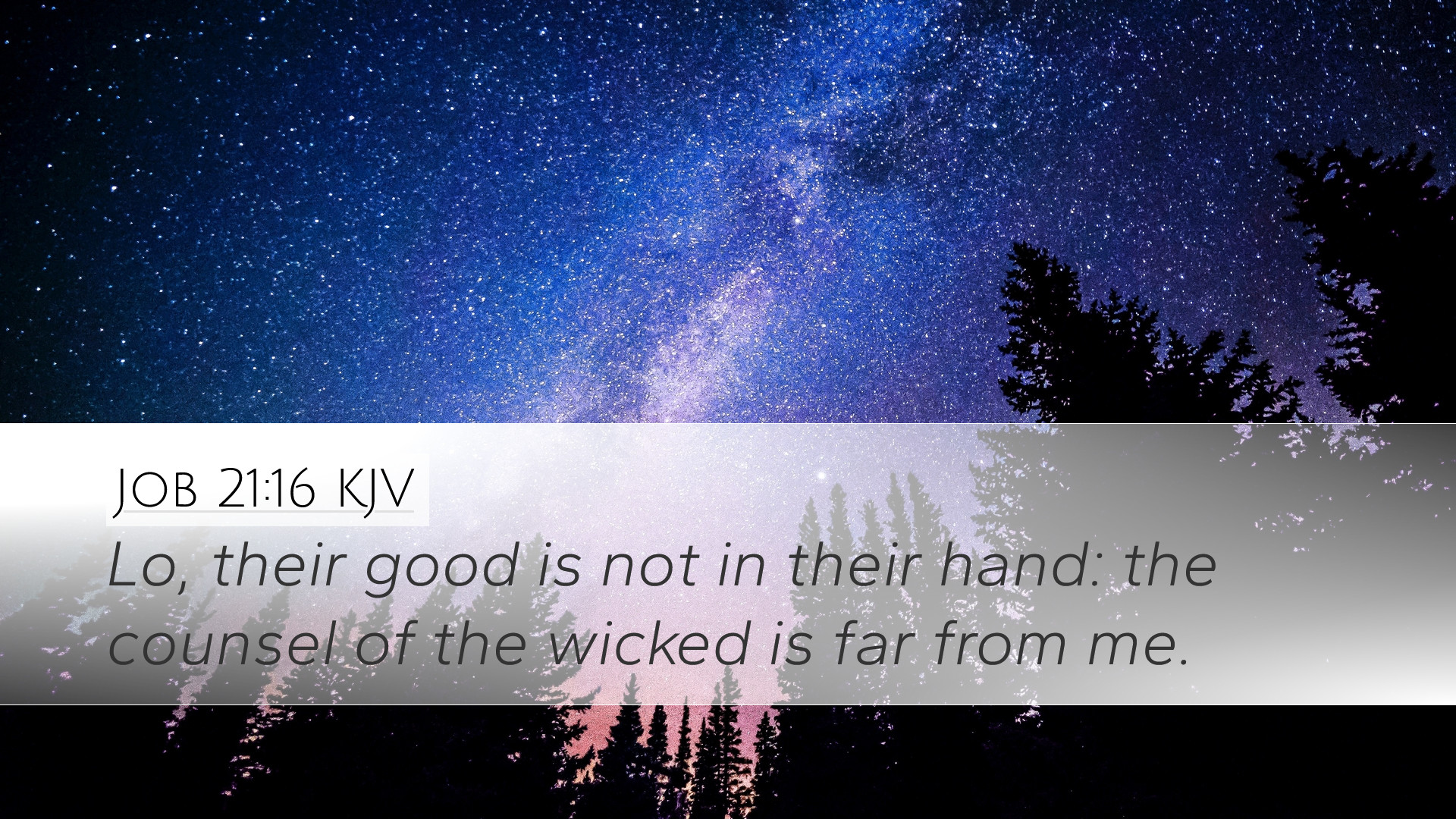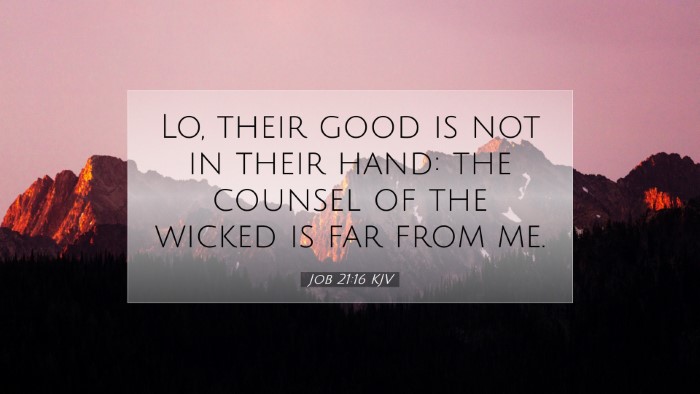Commentary on Job 21:16
Job 21:16 states, "Lo, their good is not in their hand: the counsel of the wicked is far from me." This verse captures Job's commentary on the prosperity of the wicked and their apparent immunity to the consequences of their actions. Here we shall explore insights from various public domain commentaries to illuminate this poignant verse.
Contextual Background
This verse is part of Job's response to his friends, who have claimed that the wicked suffer inevitably and are punished in this life. Job vehemently opposes this notion, defending the idea that the wicked can prosper while the righteous suffer. This profound paradox is central to the book of Job.
Matthew Henry's Commentary
Henry emphasizes that Job points out an important truth: the prosperity of the wicked. He highlights that the wicked sometimes flourish and enjoy great wealth, rendering the response of Job's friends inadequate in explaining the realities of human existence. Henry poignantly notes that:
- "The good of the wicked is not in their own hands, but in the providence of God, who may grant them outward blessings for His own purposes."
- "Job views the apparent success of the wicked as a deceptive shadow, not reflective of ultimate truth or justice."
Here, Henry articulates a grim truth: while the prosperity of the wicked may seem tangible, it is ultimately transient and devoid of true substance. He urges readers to consider the long-term consequences of one's actions rather than the fleeting successes that may present themselves along the way.
Albert Barnes' Insights
Barnes contextualizes this verse in light of Job's declaration that he is not envious of the wicked. He states that:
- "The good of the wicked refers to their possessions, but these are not truly 'in their hand' – they lack real security and blessing."
- "Without true righteousness, the counsel of the wicked ultimately leads to destruction, a sentiment Job profoundly understands."
Barnes firmly believes that Job's resolution is to reject the alluring paths of the wicked, reaffirming that their counsel, devoid of true wisdom or lasting benefit, is far from him. He advocates for the stronger fortitude found in following God, suggesting that adherence to divine guidance leads to a more fulfilling and enduring life.
Adam Clarke's Commentary
Clarke interprets Job's words as a stark rejection of the comforts and enticements of the wicked. He manifests an understanding of moral complexity, suggesting:
- "Job asserts his integrity and refuses to believe that the prosperity of the wicked is a sign of favor from God."
- "The counsel of the wicked bears no weight on Job; he remains steadfast in seeking the path of righteousness."
Clarke also reflects on how the prosperity of the wicked often blinds them to their spiritual impoverishment, leading them to rely on worldly wisdom instead of divine insight. He proposes that the counsel of wicked individuals, which often appears sensible, is a pathway far removed from the truth God has revealed.
Theological Implications
Job 21:16 serves as a catalyst for several theological discussions, notably regarding the nature of good and evil, divine justice, and human suffering. Here are some pertinent themes:
- The Nature of Prosperity and Suffering: This verse compels the reader to examine the apparent discrepancies in life. The righteous may suffer, while the wicked may prosper, challenging simplistic views of divine retribution.
- Divine Sovereignty: The assertion that "their good is not in their hand" reinforces the belief that true control lies with God, who governs all affairs, including human prosperity.
- Moral Integrity: Job’s rejection of the counsel of the wicked stresses the importance of maintaining integrity and moral standing, regardless of external circumstances.
Application for Pastors and Theologians
In preaching and teaching, this passage encourages leaders to help congregants understand that:
- Prosperity is not always indicative of righteousness; ethical living often encounters trials.
- The community of believers should strive for spiritual wealth over material gain.
- Relying on divine wisdom and guidance is paramount to counter the seductive counsel of the world.
Conclusion
In summary, Job 21:16 offers profound insight into the enigmatic relationship between good, evil, and prosperity. Both Matthew Henry and Adam Clarke, along with Albert Barnes, reinforce the idea that true worth is derived not from material possession but from the pursuit of a righteous life in accordance with God's will. This commentary invites pastors, students, and scholars alike to ponder the deeper truths about morality, divine justice, and the essence of true prosperity in the light of God's kingdom.


